The Effectiveness of Retrieval Based Learning in Cognition Course
VerifiedAdded on 2021/05/31
|10
|2773
|27
Report
AI Summary
This report analyzes a study on retrieval-based learning conducted with students in a cognition course. The study compared retrieval-based learning to re-reading, assessing students' ability to encode and retain knowledge through two tasks. The first task measured encoding ability, while the second, administered a week later, assessed retention and cognitive abilities. Findings indicated that retrieval-based learning significantly improved student performance, particularly in long-term memory retention and reducing the tip-of-the-tongue effect. The report discusses the experimental design, results, limitations (primarily the time-consuming nature and lab-based application), and implications, advocating for the adoption of retrieval-based learning, especially active retrieval, in educational settings to enhance student learning and memory retention. The study highlights the importance of intentional retrieval and its benefits over time.
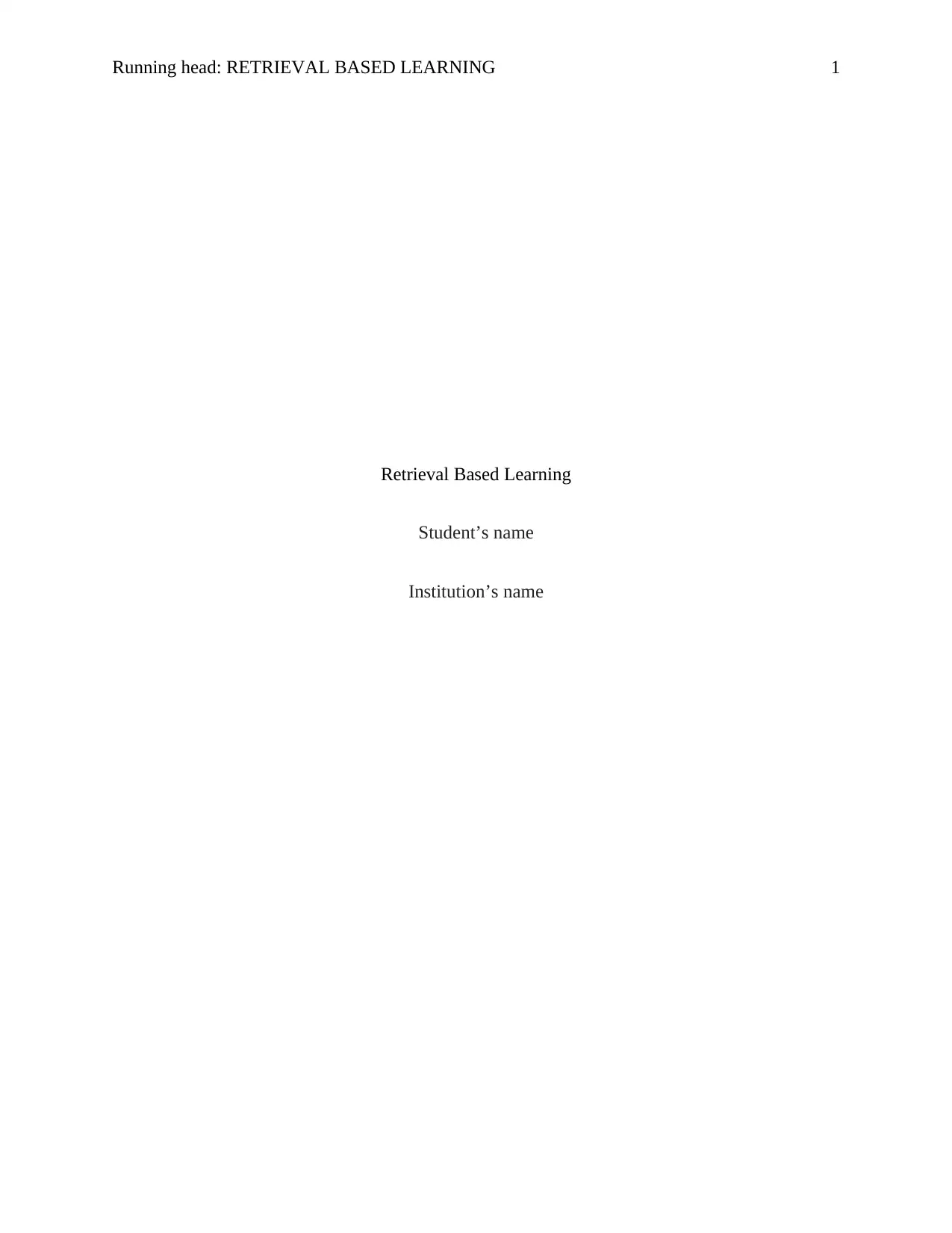
Running head: RETRIEVAL BASED LEARNING 1
Retrieval Based Learning
Student’s name
Institution’s name
Retrieval Based Learning
Student’s name
Institution’s name
Paraphrase This Document
Need a fresh take? Get an instant paraphrase of this document with our AI Paraphraser
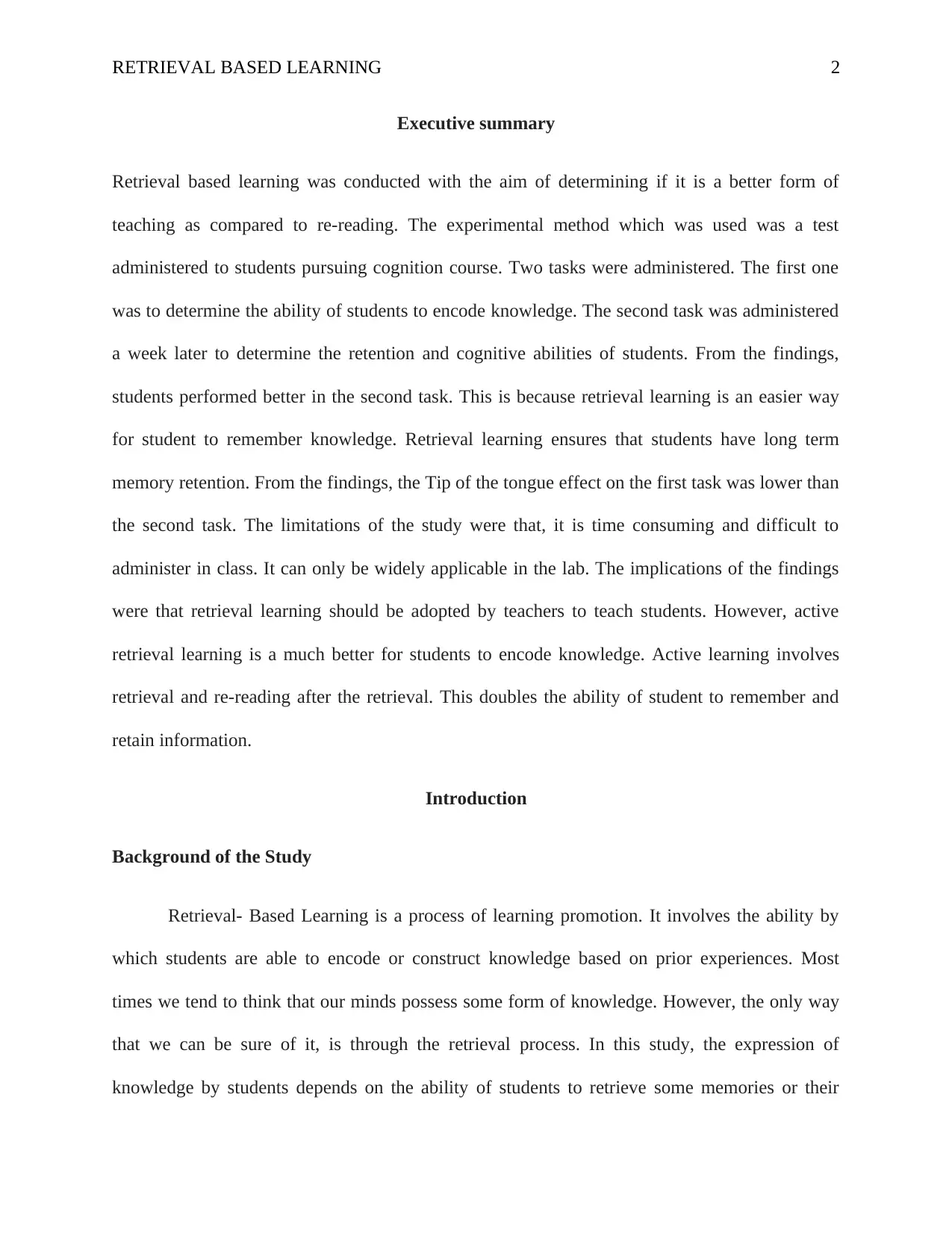
RETRIEVAL BASED LEARNING 2
Executive summary
Retrieval based learning was conducted with the aim of determining if it is a better form of
teaching as compared to re-reading. The experimental method which was used was a test
administered to students pursuing cognition course. Two tasks were administered. The first one
was to determine the ability of students to encode knowledge. The second task was administered
a week later to determine the retention and cognitive abilities of students. From the findings,
students performed better in the second task. This is because retrieval learning is an easier way
for student to remember knowledge. Retrieval learning ensures that students have long term
memory retention. From the findings, the Tip of the tongue effect on the first task was lower than
the second task. The limitations of the study were that, it is time consuming and difficult to
administer in class. It can only be widely applicable in the lab. The implications of the findings
were that retrieval learning should be adopted by teachers to teach students. However, active
retrieval learning is a much better for students to encode knowledge. Active learning involves
retrieval and re-reading after the retrieval. This doubles the ability of student to remember and
retain information.
Introduction
Background of the Study
Retrieval- Based Learning is a process of learning promotion. It involves the ability by
which students are able to encode or construct knowledge based on prior experiences. Most
times we tend to think that our minds possess some form of knowledge. However, the only way
that we can be sure of it, is through the retrieval process. In this study, the expression of
knowledge by students depends on the ability of students to retrieve some memories or their
Executive summary
Retrieval based learning was conducted with the aim of determining if it is a better form of
teaching as compared to re-reading. The experimental method which was used was a test
administered to students pursuing cognition course. Two tasks were administered. The first one
was to determine the ability of students to encode knowledge. The second task was administered
a week later to determine the retention and cognitive abilities of students. From the findings,
students performed better in the second task. This is because retrieval learning is an easier way
for student to remember knowledge. Retrieval learning ensures that students have long term
memory retention. From the findings, the Tip of the tongue effect on the first task was lower than
the second task. The limitations of the study were that, it is time consuming and difficult to
administer in class. It can only be widely applicable in the lab. The implications of the findings
were that retrieval learning should be adopted by teachers to teach students. However, active
retrieval learning is a much better for students to encode knowledge. Active learning involves
retrieval and re-reading after the retrieval. This doubles the ability of student to remember and
retain information.
Introduction
Background of the Study
Retrieval- Based Learning is a process of learning promotion. It involves the ability by
which students are able to encode or construct knowledge based on prior experiences. Most
times we tend to think that our minds possess some form of knowledge. However, the only way
that we can be sure of it, is through the retrieval process. In this study, the expression of
knowledge by students depends on the ability of students to retrieve some memories or their
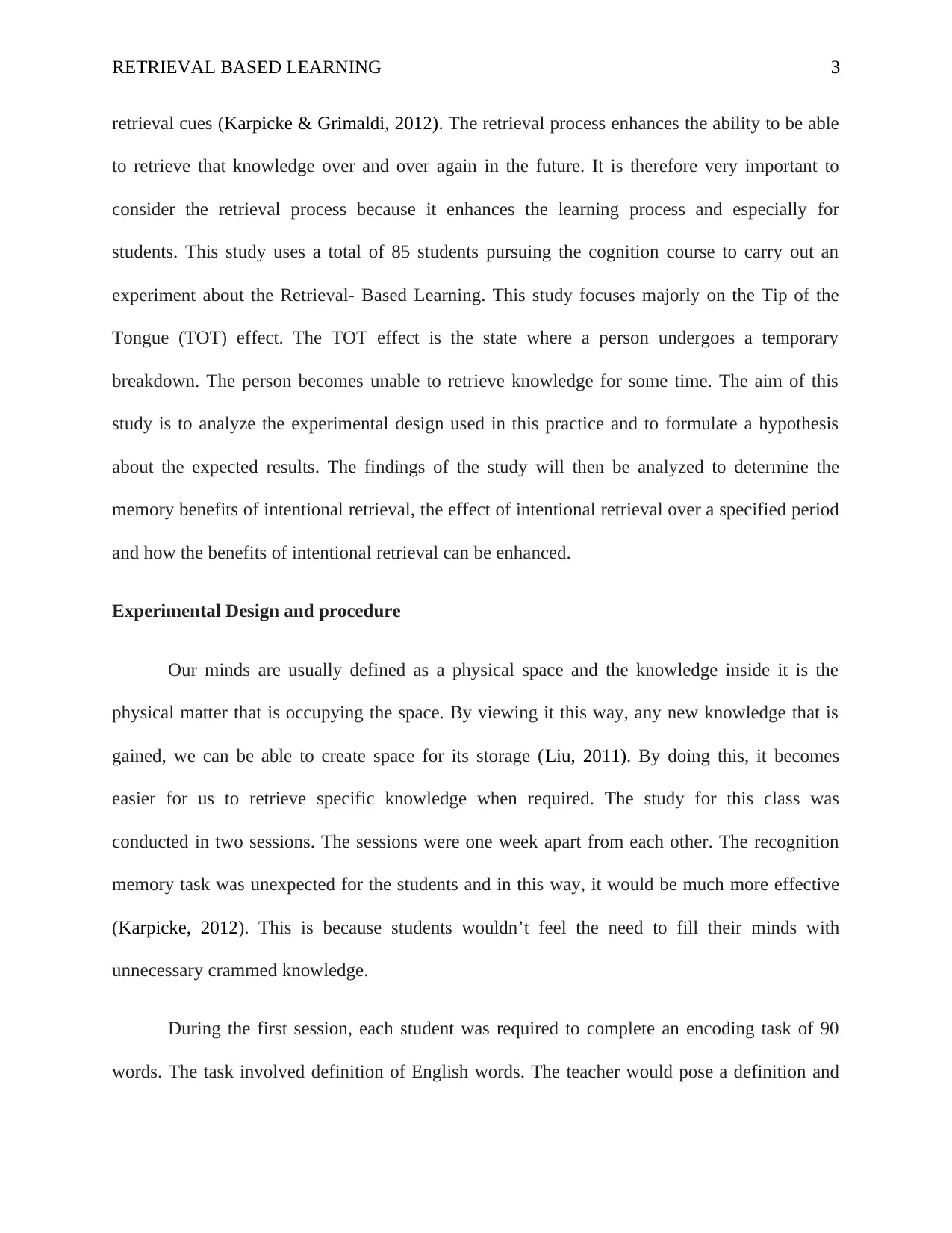
RETRIEVAL BASED LEARNING 3
retrieval cues (Karpicke & Grimaldi, 2012). The retrieval process enhances the ability to be able
to retrieve that knowledge over and over again in the future. It is therefore very important to
consider the retrieval process because it enhances the learning process and especially for
students. This study uses a total of 85 students pursuing the cognition course to carry out an
experiment about the Retrieval- Based Learning. This study focuses majorly on the Tip of the
Tongue (TOT) effect. The TOT effect is the state where a person undergoes a temporary
breakdown. The person becomes unable to retrieve knowledge for some time. The aim of this
study is to analyze the experimental design used in this practice and to formulate a hypothesis
about the expected results. The findings of the study will then be analyzed to determine the
memory benefits of intentional retrieval, the effect of intentional retrieval over a specified period
and how the benefits of intentional retrieval can be enhanced.
Experimental Design and procedure
Our minds are usually defined as a physical space and the knowledge inside it is the
physical matter that is occupying the space. By viewing it this way, any new knowledge that is
gained, we can be able to create space for its storage (Liu, 2011). By doing this, it becomes
easier for us to retrieve specific knowledge when required. The study for this class was
conducted in two sessions. The sessions were one week apart from each other. The recognition
memory task was unexpected for the students and in this way, it would be much more effective
(Karpicke, 2012). This is because students wouldn’t feel the need to fill their minds with
unnecessary crammed knowledge.
During the first session, each student was required to complete an encoding task of 90
words. The task involved definition of English words. The teacher would pose a definition and
retrieval cues (Karpicke & Grimaldi, 2012). The retrieval process enhances the ability to be able
to retrieve that knowledge over and over again in the future. It is therefore very important to
consider the retrieval process because it enhances the learning process and especially for
students. This study uses a total of 85 students pursuing the cognition course to carry out an
experiment about the Retrieval- Based Learning. This study focuses majorly on the Tip of the
Tongue (TOT) effect. The TOT effect is the state where a person undergoes a temporary
breakdown. The person becomes unable to retrieve knowledge for some time. The aim of this
study is to analyze the experimental design used in this practice and to formulate a hypothesis
about the expected results. The findings of the study will then be analyzed to determine the
memory benefits of intentional retrieval, the effect of intentional retrieval over a specified period
and how the benefits of intentional retrieval can be enhanced.
Experimental Design and procedure
Our minds are usually defined as a physical space and the knowledge inside it is the
physical matter that is occupying the space. By viewing it this way, any new knowledge that is
gained, we can be able to create space for its storage (Liu, 2011). By doing this, it becomes
easier for us to retrieve specific knowledge when required. The study for this class was
conducted in two sessions. The sessions were one week apart from each other. The recognition
memory task was unexpected for the students and in this way, it would be much more effective
(Karpicke, 2012). This is because students wouldn’t feel the need to fill their minds with
unnecessary crammed knowledge.
During the first session, each student was required to complete an encoding task of 90
words. The task involved definition of English words. The teacher would pose a definition and
⊘ This is a preview!⊘
Do you want full access?
Subscribe today to unlock all pages.

Trusted by 1+ million students worldwide
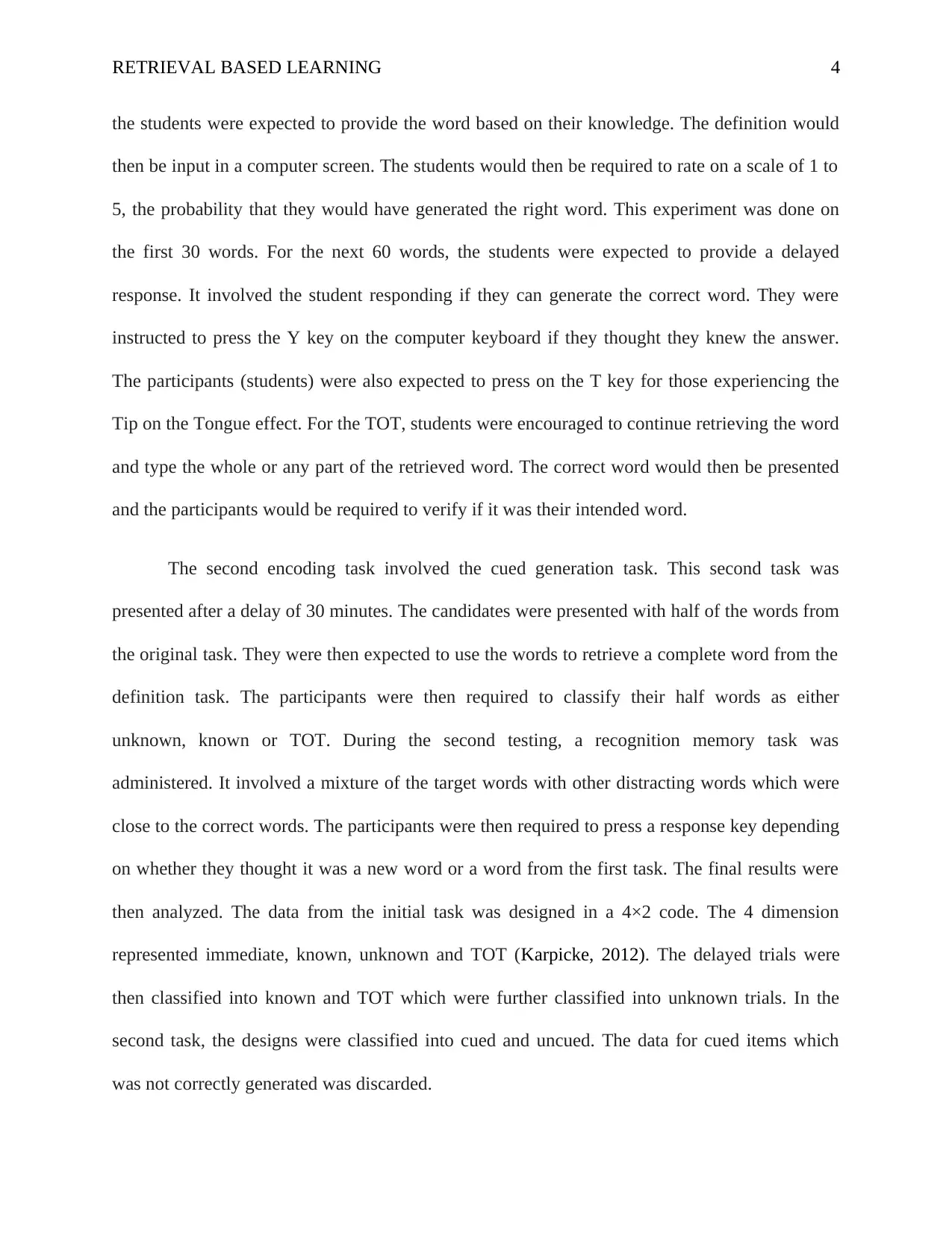
RETRIEVAL BASED LEARNING 4
the students were expected to provide the word based on their knowledge. The definition would
then be input in a computer screen. The students would then be required to rate on a scale of 1 to
5, the probability that they would have generated the right word. This experiment was done on
the first 30 words. For the next 60 words, the students were expected to provide a delayed
response. It involved the student responding if they can generate the correct word. They were
instructed to press the Y key on the computer keyboard if they thought they knew the answer.
The participants (students) were also expected to press on the T key for those experiencing the
Tip on the Tongue effect. For the TOT, students were encouraged to continue retrieving the word
and type the whole or any part of the retrieved word. The correct word would then be presented
and the participants would be required to verify if it was their intended word.
The second encoding task involved the cued generation task. This second task was
presented after a delay of 30 minutes. The candidates were presented with half of the words from
the original task. They were then expected to use the words to retrieve a complete word from the
definition task. The participants were then required to classify their half words as either
unknown, known or TOT. During the second testing, a recognition memory task was
administered. It involved a mixture of the target words with other distracting words which were
close to the correct words. The participants were then required to press a response key depending
on whether they thought it was a new word or a word from the first task. The final results were
then analyzed. The data from the initial task was designed in a 4×2 code. The 4 dimension
represented immediate, known, unknown and TOT (Karpicke, 2012). The delayed trials were
then classified into known and TOT which were further classified into unknown trials. In the
second task, the designs were classified into cued and uncued. The data for cued items which
was not correctly generated was discarded.
the students were expected to provide the word based on their knowledge. The definition would
then be input in a computer screen. The students would then be required to rate on a scale of 1 to
5, the probability that they would have generated the right word. This experiment was done on
the first 30 words. For the next 60 words, the students were expected to provide a delayed
response. It involved the student responding if they can generate the correct word. They were
instructed to press the Y key on the computer keyboard if they thought they knew the answer.
The participants (students) were also expected to press on the T key for those experiencing the
Tip on the Tongue effect. For the TOT, students were encouraged to continue retrieving the word
and type the whole or any part of the retrieved word. The correct word would then be presented
and the participants would be required to verify if it was their intended word.
The second encoding task involved the cued generation task. This second task was
presented after a delay of 30 minutes. The candidates were presented with half of the words from
the original task. They were then expected to use the words to retrieve a complete word from the
definition task. The participants were then required to classify their half words as either
unknown, known or TOT. During the second testing, a recognition memory task was
administered. It involved a mixture of the target words with other distracting words which were
close to the correct words. The participants were then required to press a response key depending
on whether they thought it was a new word or a word from the first task. The final results were
then analyzed. The data from the initial task was designed in a 4×2 code. The 4 dimension
represented immediate, known, unknown and TOT (Karpicke, 2012). The delayed trials were
then classified into known and TOT which were further classified into unknown trials. In the
second task, the designs were classified into cued and uncued. The data for cued items which
was not correctly generated was discarded.
Paraphrase This Document
Need a fresh take? Get an instant paraphrase of this document with our AI Paraphraser
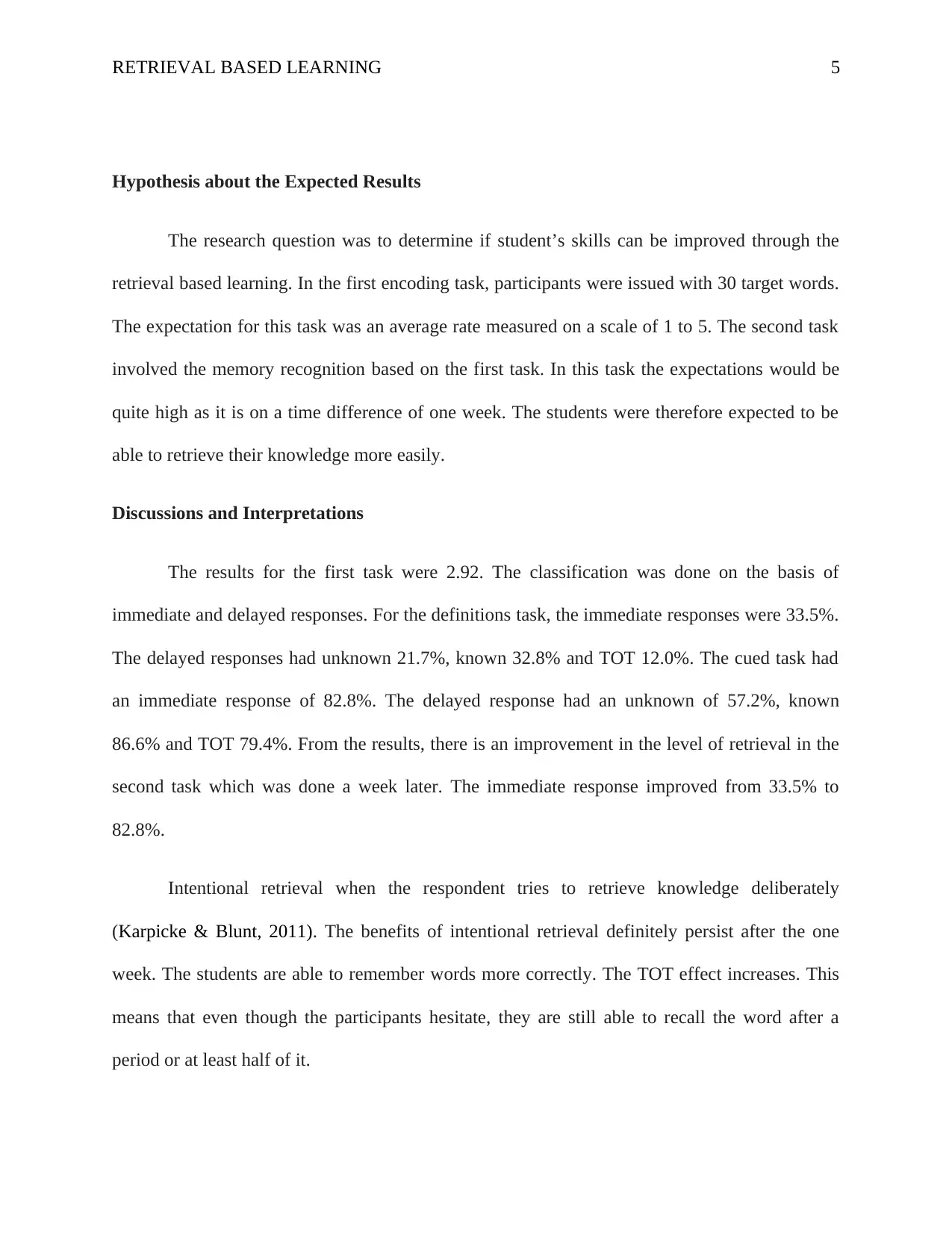
RETRIEVAL BASED LEARNING 5
Hypothesis about the Expected Results
The research question was to determine if student’s skills can be improved through the
retrieval based learning. In the first encoding task, participants were issued with 30 target words.
The expectation for this task was an average rate measured on a scale of 1 to 5. The second task
involved the memory recognition based on the first task. In this task the expectations would be
quite high as it is on a time difference of one week. The students were therefore expected to be
able to retrieve their knowledge more easily.
Discussions and Interpretations
The results for the first task were 2.92. The classification was done on the basis of
immediate and delayed responses. For the definitions task, the immediate responses were 33.5%.
The delayed responses had unknown 21.7%, known 32.8% and TOT 12.0%. The cued task had
an immediate response of 82.8%. The delayed response had an unknown of 57.2%, known
86.6% and TOT 79.4%. From the results, there is an improvement in the level of retrieval in the
second task which was done a week later. The immediate response improved from 33.5% to
82.8%.
Intentional retrieval when the respondent tries to retrieve knowledge deliberately
(Karpicke & Blunt, 2011). The benefits of intentional retrieval definitely persist after the one
week. The students are able to remember words more correctly. The TOT effect increases. This
means that even though the participants hesitate, they are still able to recall the word after a
period or at least half of it.
Hypothesis about the Expected Results
The research question was to determine if student’s skills can be improved through the
retrieval based learning. In the first encoding task, participants were issued with 30 target words.
The expectation for this task was an average rate measured on a scale of 1 to 5. The second task
involved the memory recognition based on the first task. In this task the expectations would be
quite high as it is on a time difference of one week. The students were therefore expected to be
able to retrieve their knowledge more easily.
Discussions and Interpretations
The results for the first task were 2.92. The classification was done on the basis of
immediate and delayed responses. For the definitions task, the immediate responses were 33.5%.
The delayed responses had unknown 21.7%, known 32.8% and TOT 12.0%. The cued task had
an immediate response of 82.8%. The delayed response had an unknown of 57.2%, known
86.6% and TOT 79.4%. From the results, there is an improvement in the level of retrieval in the
second task which was done a week later. The immediate response improved from 33.5% to
82.8%.
Intentional retrieval when the respondent tries to retrieve knowledge deliberately
(Karpicke & Blunt, 2011). The benefits of intentional retrieval definitely persist after the one
week. The students are able to remember words more correctly. The TOT effect increases. This
means that even though the participants hesitate, they are still able to recall the word after a
period or at least half of it.
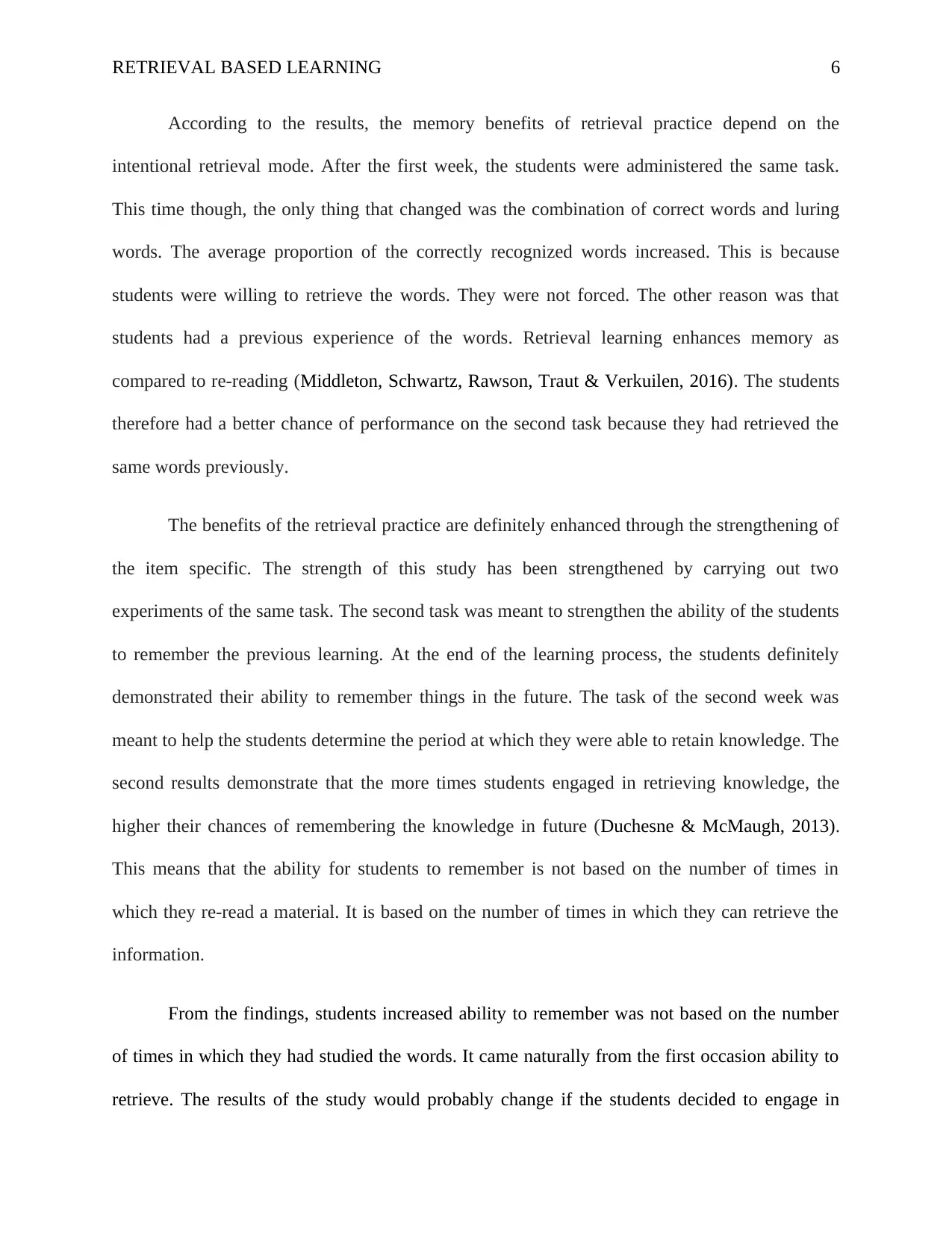
RETRIEVAL BASED LEARNING 6
According to the results, the memory benefits of retrieval practice depend on the
intentional retrieval mode. After the first week, the students were administered the same task.
This time though, the only thing that changed was the combination of correct words and luring
words. The average proportion of the correctly recognized words increased. This is because
students were willing to retrieve the words. They were not forced. The other reason was that
students had a previous experience of the words. Retrieval learning enhances memory as
compared to re-reading (Middleton, Schwartz, Rawson, Traut & Verkuilen, 2016). The students
therefore had a better chance of performance on the second task because they had retrieved the
same words previously.
The benefits of the retrieval practice are definitely enhanced through the strengthening of
the item specific. The strength of this study has been strengthened by carrying out two
experiments of the same task. The second task was meant to strengthen the ability of the students
to remember the previous learning. At the end of the learning process, the students definitely
demonstrated their ability to remember things in the future. The task of the second week was
meant to help the students determine the period at which they were able to retain knowledge. The
second results demonstrate that the more times students engaged in retrieving knowledge, the
higher their chances of remembering the knowledge in future (Duchesne & McMaugh, 2013).
This means that the ability for students to remember is not based on the number of times in
which they re-read a material. It is based on the number of times in which they can retrieve the
information.
From the findings, students increased ability to remember was not based on the number
of times in which they had studied the words. It came naturally from the first occasion ability to
retrieve. The results of the study would probably change if the students decided to engage in
According to the results, the memory benefits of retrieval practice depend on the
intentional retrieval mode. After the first week, the students were administered the same task.
This time though, the only thing that changed was the combination of correct words and luring
words. The average proportion of the correctly recognized words increased. This is because
students were willing to retrieve the words. They were not forced. The other reason was that
students had a previous experience of the words. Retrieval learning enhances memory as
compared to re-reading (Middleton, Schwartz, Rawson, Traut & Verkuilen, 2016). The students
therefore had a better chance of performance on the second task because they had retrieved the
same words previously.
The benefits of the retrieval practice are definitely enhanced through the strengthening of
the item specific. The strength of this study has been strengthened by carrying out two
experiments of the same task. The second task was meant to strengthen the ability of the students
to remember the previous learning. At the end of the learning process, the students definitely
demonstrated their ability to remember things in the future. The task of the second week was
meant to help the students determine the period at which they were able to retain knowledge. The
second results demonstrate that the more times students engaged in retrieving knowledge, the
higher their chances of remembering the knowledge in future (Duchesne & McMaugh, 2013).
This means that the ability for students to remember is not based on the number of times in
which they re-read a material. It is based on the number of times in which they can retrieve the
information.
From the findings, students increased ability to remember was not based on the number
of times in which they had studied the words. It came naturally from the first occasion ability to
retrieve. The results of the study would probably change if the students decided to engage in
⊘ This is a preview!⊘
Do you want full access?
Subscribe today to unlock all pages.

Trusted by 1+ million students worldwide
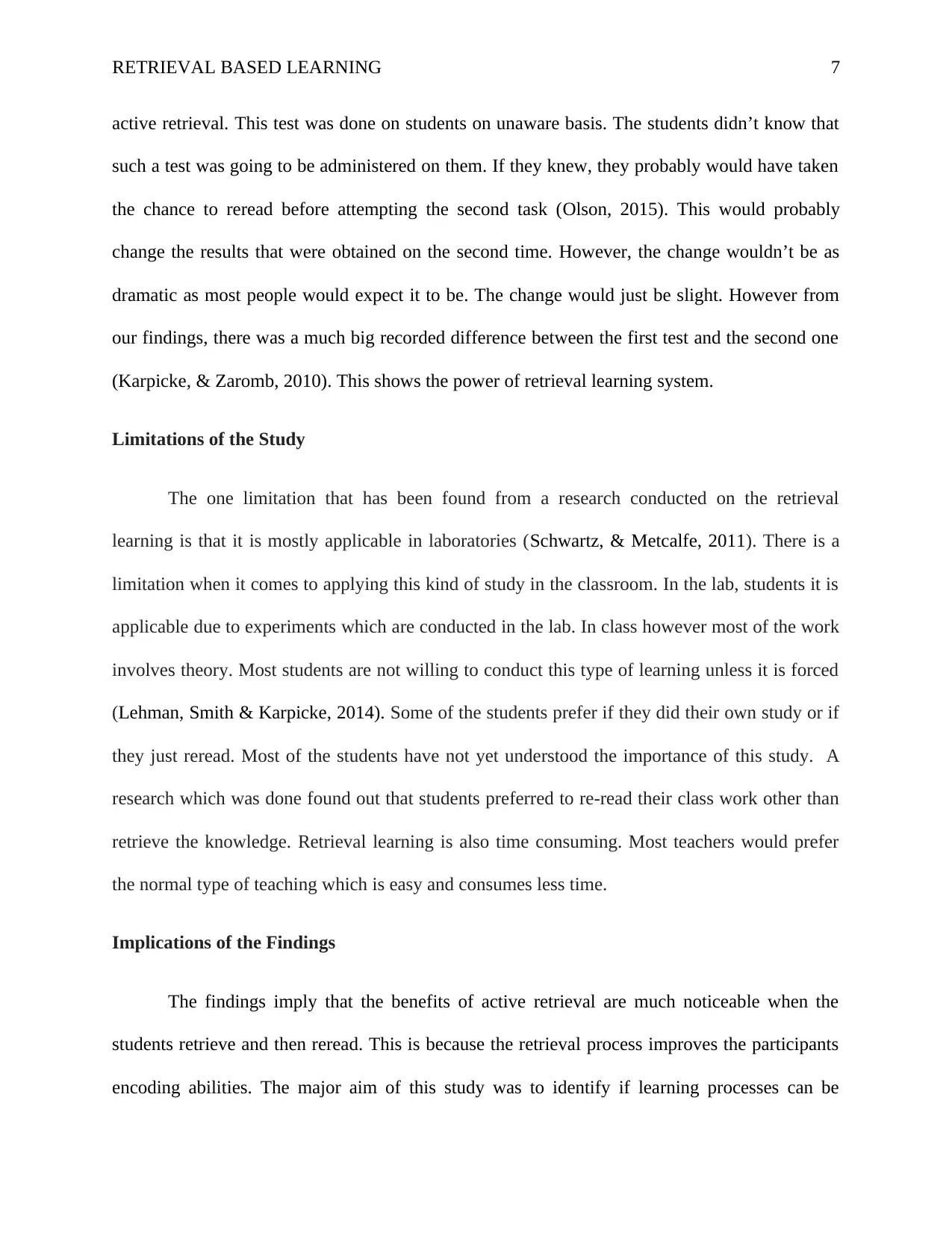
RETRIEVAL BASED LEARNING 7
active retrieval. This test was done on students on unaware basis. The students didn’t know that
such a test was going to be administered on them. If they knew, they probably would have taken
the chance to reread before attempting the second task (Olson, 2015). This would probably
change the results that were obtained on the second time. However, the change wouldn’t be as
dramatic as most people would expect it to be. The change would just be slight. However from
our findings, there was a much big recorded difference between the first test and the second one
(Karpicke, & Zaromb, 2010). This shows the power of retrieval learning system.
Limitations of the Study
The one limitation that has been found from a research conducted on the retrieval
learning is that it is mostly applicable in laboratories (Schwartz, & Metcalfe, 2011). There is a
limitation when it comes to applying this kind of study in the classroom. In the lab, students it is
applicable due to experiments which are conducted in the lab. In class however most of the work
involves theory. Most students are not willing to conduct this type of learning unless it is forced
(Lehman, Smith & Karpicke, 2014). Some of the students prefer if they did their own study or if
they just reread. Most of the students have not yet understood the importance of this study. A
research which was done found out that students preferred to re-read their class work other than
retrieve the knowledge. Retrieval learning is also time consuming. Most teachers would prefer
the normal type of teaching which is easy and consumes less time.
Implications of the Findings
The findings imply that the benefits of active retrieval are much noticeable when the
students retrieve and then reread. This is because the retrieval process improves the participants
encoding abilities. The major aim of this study was to identify if learning processes can be
active retrieval. This test was done on students on unaware basis. The students didn’t know that
such a test was going to be administered on them. If they knew, they probably would have taken
the chance to reread before attempting the second task (Olson, 2015). This would probably
change the results that were obtained on the second time. However, the change wouldn’t be as
dramatic as most people would expect it to be. The change would just be slight. However from
our findings, there was a much big recorded difference between the first test and the second one
(Karpicke, & Zaromb, 2010). This shows the power of retrieval learning system.
Limitations of the Study
The one limitation that has been found from a research conducted on the retrieval
learning is that it is mostly applicable in laboratories (Schwartz, & Metcalfe, 2011). There is a
limitation when it comes to applying this kind of study in the classroom. In the lab, students it is
applicable due to experiments which are conducted in the lab. In class however most of the work
involves theory. Most students are not willing to conduct this type of learning unless it is forced
(Lehman, Smith & Karpicke, 2014). Some of the students prefer if they did their own study or if
they just reread. Most of the students have not yet understood the importance of this study. A
research which was done found out that students preferred to re-read their class work other than
retrieve the knowledge. Retrieval learning is also time consuming. Most teachers would prefer
the normal type of teaching which is easy and consumes less time.
Implications of the Findings
The findings imply that the benefits of active retrieval are much noticeable when the
students retrieve and then reread. This is because the retrieval process improves the participants
encoding abilities. The major aim of this study was to identify if learning processes can be
Paraphrase This Document
Need a fresh take? Get an instant paraphrase of this document with our AI Paraphraser
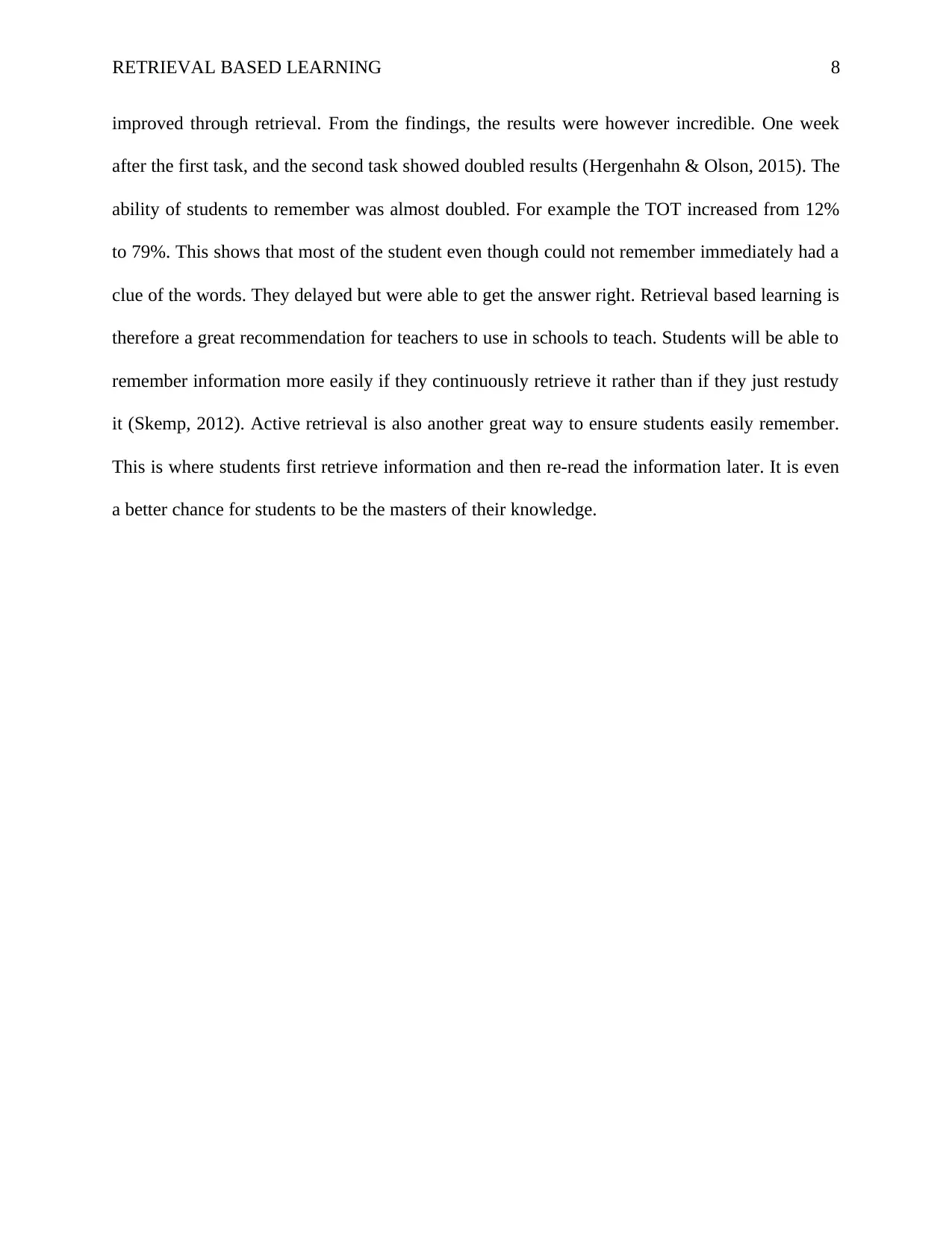
RETRIEVAL BASED LEARNING 8
improved through retrieval. From the findings, the results were however incredible. One week
after the first task, and the second task showed doubled results (Hergenhahn & Olson, 2015). The
ability of students to remember was almost doubled. For example the TOT increased from 12%
to 79%. This shows that most of the student even though could not remember immediately had a
clue of the words. They delayed but were able to get the answer right. Retrieval based learning is
therefore a great recommendation for teachers to use in schools to teach. Students will be able to
remember information more easily if they continuously retrieve it rather than if they just restudy
it (Skemp, 2012). Active retrieval is also another great way to ensure students easily remember.
This is where students first retrieve information and then re-read the information later. It is even
a better chance for students to be the masters of their knowledge.
improved through retrieval. From the findings, the results were however incredible. One week
after the first task, and the second task showed doubled results (Hergenhahn & Olson, 2015). The
ability of students to remember was almost doubled. For example the TOT increased from 12%
to 79%. This shows that most of the student even though could not remember immediately had a
clue of the words. They delayed but were able to get the answer right. Retrieval based learning is
therefore a great recommendation for teachers to use in schools to teach. Students will be able to
remember information more easily if they continuously retrieve it rather than if they just restudy
it (Skemp, 2012). Active retrieval is also another great way to ensure students easily remember.
This is where students first retrieve information and then re-read the information later. It is even
a better chance for students to be the masters of their knowledge.
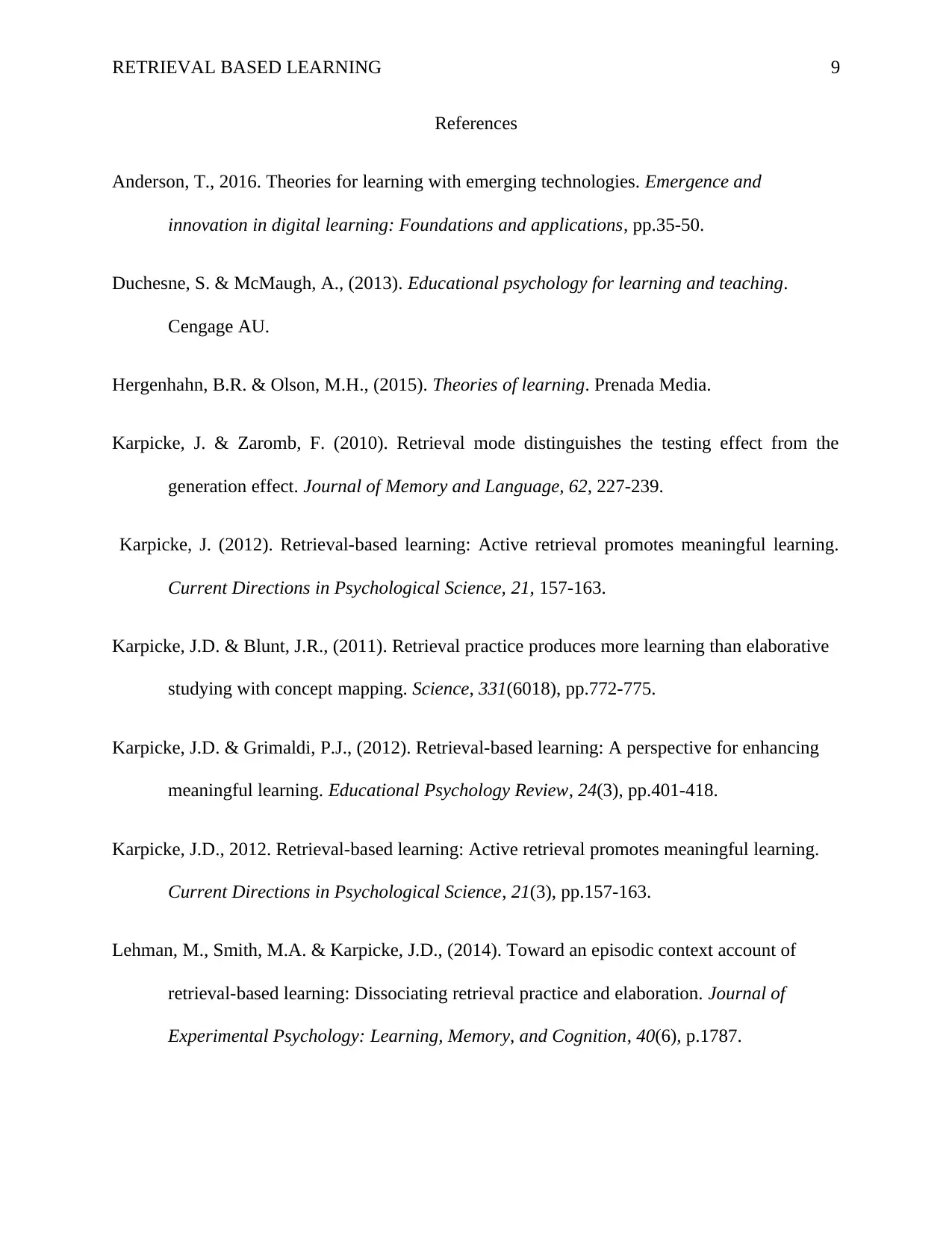
RETRIEVAL BASED LEARNING 9
References
Anderson, T., 2016. Theories for learning with emerging technologies. Emergence and
innovation in digital learning: Foundations and applications, pp.35-50.
Duchesne, S. & McMaugh, A., (2013). Educational psychology for learning and teaching.
Cengage AU.
Hergenhahn, B.R. & Olson, M.H., (2015). Theories of learning. Prenada Media.
Karpicke, J. & Zaromb, F. (2010). Retrieval mode distinguishes the testing effect from the
generation effect. Journal of Memory and Language, 62, 227-239.
Karpicke, J. (2012). Retrieval-based learning: Active retrieval promotes meaningful learning.
Current Directions in Psychological Science, 21, 157-163.
Karpicke, J.D. & Blunt, J.R., (2011). Retrieval practice produces more learning than elaborative
studying with concept mapping. Science, 331(6018), pp.772-775.
Karpicke, J.D. & Grimaldi, P.J., (2012). Retrieval-based learning: A perspective for enhancing
meaningful learning. Educational Psychology Review, 24(3), pp.401-418.
Karpicke, J.D., 2012. Retrieval-based learning: Active retrieval promotes meaningful learning.
Current Directions in Psychological Science, 21(3), pp.157-163.
Lehman, M., Smith, M.A. & Karpicke, J.D., (2014). Toward an episodic context account of
retrieval-based learning: Dissociating retrieval practice and elaboration. Journal of
Experimental Psychology: Learning, Memory, and Cognition, 40(6), p.1787.
References
Anderson, T., 2016. Theories for learning with emerging technologies. Emergence and
innovation in digital learning: Foundations and applications, pp.35-50.
Duchesne, S. & McMaugh, A., (2013). Educational psychology for learning and teaching.
Cengage AU.
Hergenhahn, B.R. & Olson, M.H., (2015). Theories of learning. Prenada Media.
Karpicke, J. & Zaromb, F. (2010). Retrieval mode distinguishes the testing effect from the
generation effect. Journal of Memory and Language, 62, 227-239.
Karpicke, J. (2012). Retrieval-based learning: Active retrieval promotes meaningful learning.
Current Directions in Psychological Science, 21, 157-163.
Karpicke, J.D. & Blunt, J.R., (2011). Retrieval practice produces more learning than elaborative
studying with concept mapping. Science, 331(6018), pp.772-775.
Karpicke, J.D. & Grimaldi, P.J., (2012). Retrieval-based learning: A perspective for enhancing
meaningful learning. Educational Psychology Review, 24(3), pp.401-418.
Karpicke, J.D., 2012. Retrieval-based learning: Active retrieval promotes meaningful learning.
Current Directions in Psychological Science, 21(3), pp.157-163.
Lehman, M., Smith, M.A. & Karpicke, J.D., (2014). Toward an episodic context account of
retrieval-based learning: Dissociating retrieval practice and elaboration. Journal of
Experimental Psychology: Learning, Memory, and Cognition, 40(6), p.1787.
⊘ This is a preview!⊘
Do you want full access?
Subscribe today to unlock all pages.

Trusted by 1+ million students worldwide
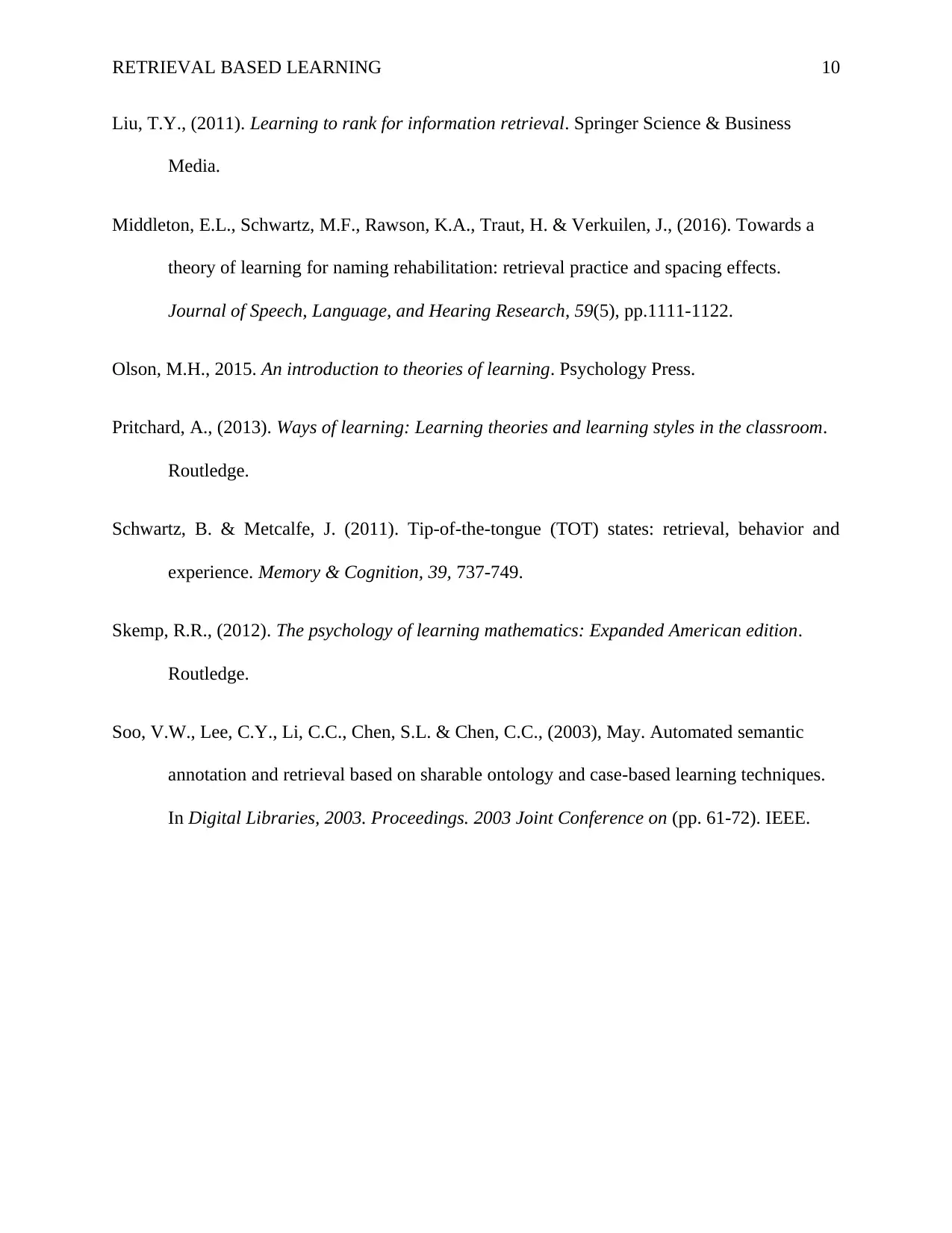
RETRIEVAL BASED LEARNING 10
Liu, T.Y., (2011). Learning to rank for information retrieval. Springer Science & Business
Media.
Middleton, E.L., Schwartz, M.F., Rawson, K.A., Traut, H. & Verkuilen, J., (2016). Towards a
theory of learning for naming rehabilitation: retrieval practice and spacing effects.
Journal of Speech, Language, and Hearing Research, 59(5), pp.1111-1122.
Olson, M.H., 2015. An introduction to theories of learning. Psychology Press.
Pritchard, A., (2013). Ways of learning: Learning theories and learning styles in the classroom.
Routledge.
Schwartz, B. & Metcalfe, J. (2011). Tip-of-the-tongue (TOT) states: retrieval, behavior and
experience. Memory & Cognition, 39, 737-749.
Skemp, R.R., (2012). The psychology of learning mathematics: Expanded American edition.
Routledge.
Soo, V.W., Lee, C.Y., Li, C.C., Chen, S.L. & Chen, C.C., (2003), May. Automated semantic
annotation and retrieval based on sharable ontology and case-based learning techniques.
In Digital Libraries, 2003. Proceedings. 2003 Joint Conference on (pp. 61-72). IEEE.
Liu, T.Y., (2011). Learning to rank for information retrieval. Springer Science & Business
Media.
Middleton, E.L., Schwartz, M.F., Rawson, K.A., Traut, H. & Verkuilen, J., (2016). Towards a
theory of learning for naming rehabilitation: retrieval practice and spacing effects.
Journal of Speech, Language, and Hearing Research, 59(5), pp.1111-1122.
Olson, M.H., 2015. An introduction to theories of learning. Psychology Press.
Pritchard, A., (2013). Ways of learning: Learning theories and learning styles in the classroom.
Routledge.
Schwartz, B. & Metcalfe, J. (2011). Tip-of-the-tongue (TOT) states: retrieval, behavior and
experience. Memory & Cognition, 39, 737-749.
Skemp, R.R., (2012). The psychology of learning mathematics: Expanded American edition.
Routledge.
Soo, V.W., Lee, C.Y., Li, C.C., Chen, S.L. & Chen, C.C., (2003), May. Automated semantic
annotation and retrieval based on sharable ontology and case-based learning techniques.
In Digital Libraries, 2003. Proceedings. 2003 Joint Conference on (pp. 61-72). IEEE.
1 out of 10
Related Documents
Your All-in-One AI-Powered Toolkit for Academic Success.
+13062052269
info@desklib.com
Available 24*7 on WhatsApp / Email
![[object Object]](/_next/static/media/star-bottom.7253800d.svg)
Unlock your academic potential
Copyright © 2020–2026 A2Z Services. All Rights Reserved. Developed and managed by ZUCOL.





